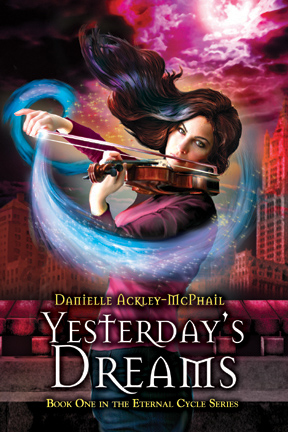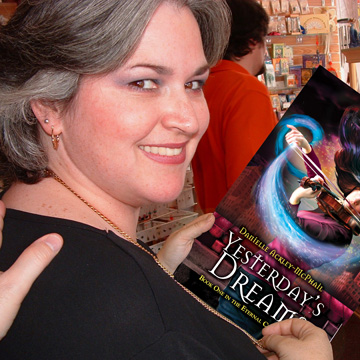I’ve known Danielle Ackley-McPhail since around her second anthology, No Longer Dreams, something more than a decade now. We first met at World Horror Con in New York City, introduced by a mutual friend, the late CJ Henderson. Over the years, we’ve become good friends and colleagues and have weathered many a convention and writing project together. Danielle has remained one of my staunchest supporters as a writer, inviting me to contribute to many of her anthologies, editing my novella, Three Chords of Chaos, and generally showing the kind of unwavering belief in my work that every writer hopes for in an editor. I’m not the only one. Danielle, like our good friend and mentor who introduced us, has taken many a writer under her wing and helped them find their footing, polish their work, and launch their writing career. She has edited and launched numerous anthologies, becoming something of a legend for the launch parties she organizes for new books each year at Balticon. I believe one of the things that makes Danielle such a terrific editor is that she is also a gifted writer and thus understands exactly what each author she works with puts into their stories, what they sacrifice for their writing, and what it means to take creative risks.
A while back, I realized I’d become a huge fan of Danielle’s writing, having read many of her short stories in anthologies and then her Eternal Cycle series of novels. We spent a lot of time talking about writing, and since she was frequently my editor, my writing in particular. So I thought it would be fun to turn the tables and talk to Danielle about her writing, in-depth, and dig in behind the scenes of her many projects. As writing projects sometimes do, though, what was intended as an interview about Dani’s novels blossomed into something of a retrospective look at her entire body of work. And as delays here and there dragged out completion of our conversation, ever-busy Dani published more work–even launching her own publishing company, eSpec Books–leading us to extend the interview, and leading us finally to what will be a four-part series getting down and dirty with Dani about her books, how she does research, her thoughts on writing, editing, and publishing, and what to expect from her in the future. Check back here every Wednesday for the next month to read more!
ABOUT DANIELLE ACKLEY-MCPHAIL: Danielle is an award-winning author and editor. Her work ranges from fantasy to science fiction to steampunk to poetry and non-fiction. She is a fixture on the mid-Atlantic science-fiction and fantasy convention scene, where she frequently appears on panels, gives readings, and coordinates events at numerous conventions. Her writings include The Eternal Cycle trilogy of Celtic urban fantasy, the Wild Hunt series—including The Halfling’s Court and The Redcap’s Queen—about biker faeries, a collection of science fiction stories, A Legacy of Stars, and one of fantasy, Consigned to the Sea as well as the writing guide, The Literary Handyman—and most recently the steampunk faerie tale, Baba Ali and the Clockwork Djinn, a novel co-authored with Day Al Mohamed. She is a co-editor of the award-winning Bad-Ass Faeries anthology series, as well as the fantasy anthology Dragon’s Lure, and the steampunk volumes, A Clockwork Chaos, In an Iron Cage, and the forthcoming Gaslight and Grimm. A costumer and multiple masquerade champion, she is also the purveyor of wickedly wonderful costume horns, for which she earned the nickname “The Hornie Lady” from the young son of a fellow author.
Inspired by a fascination with mythology, legend, and fairy tales as well as a love of creating characters, Danielle has developed a unique writing style that invites readers into her characters’ lives in an intimate and compelling fashion. Based on in-depth research and her expansive imagination, she illuminates richly detailed worlds populated by fantastic beings both noble and savage and humans who rise to extraordinary challenges or fall in the attempt. In all of her writing she strives to lead her readers to wondrous and unexpected places, to make them care deeply about her characters, and above all to create cool books. Her work spans multiple genres and forms, and she is as accomplished an editor as an author, giving her a unique perspective on the contemporary fantasy and science fiction scene. Danielle recently took the time to talk with me about the full scope of her work, her writing and editing, and how she hopes her work will leave its mark on her readers.
More about Danielle and her writing is available on her website and her Amazon author page.
The Eternal Cycle books blend old Celtic mythology with contemporary characters, themes, and settings. Do you see a role for mythology, and Celtic mythology in particular, in general in today’s world other than in fiction?
There are very few aspects of our lives that are not touched by myth or legend in some way. TV shows, movies, music, even science gives some nod to the legends most of us are familiar with in some way.
In science, technology, sports teams, and commercial concerns concepts and innovations often draw their name from the same sources, for the same reasons. The Trojan Horse as a computer virus; the Midas Touch as a corporate slogan or to indicate a successful business man; Pandora’s box referencing a treacherous situation…the examples are endless. As a people we want deeper meaning in our lives, as a society, we want to connect with celebrity, even if it is just in some small way, and the figures of myth and legend are the celebrities of the ancient world. In addition to that, society connects certain concepts with characteristics: Spartans are bad-ass, Phoenix cannot die, Venus is the epitome of beauty. Those are the kinds of connections industry wants customers to associate with their products, hoping the unconscious association will work in their favor.
The application works much the same with creative ventures, though for different reasons. The themes are universal, even if the particulars of the legends are culture-specific. This is evident by the parallels that are found in world mythology, folklore, and legend. This even includes the major religions today. In our entertainment (books, media, visual arts) the use of mythology adds depth and resonance with the audience. By drawing on that resonance the author or artist builds a foundation for the story they want to tell, helping to anchor the audience more quickly in the creative piece, regardless of genre. This is an invaluable tool for authors in particular. The content of those ancient tales can easily be adapted as the framework of a more modern or futuristic tale, or simply used as a literary allusion to enrich a creative piece. Names and elements used as background details to compliment the creator’s original concepts. Alternately, the same names and elements can be utilized to create irony or dissonance when used in ways that contradict the ancient references they are drawn from.
 You researched the series thoroughly and included a bibliography of sources in each novel. Do you see research as an important part of writing fantasy? Do you find it constraining or helpful?
You researched the series thoroughly and included a bibliography of sources in each novel. Do you see research as an important part of writing fantasy? Do you find it constraining or helpful?
It really depends on the novel. With the Eternal Cycle series research was a key part because I had a specific intent: to explore Celtic myth and legend. I have always been drawn to books with a Celtic feel but was often disappointed because most of the books I picked up only utilized the flavor of the culture, loosely utilizing a generic mythos. I like to learn something even when I am reading fiction so this approach always left me wanting, even when I enjoyed the book. When I realized I was, in fact, writing a novel I decided that I needed to write the type of story I was always looking for. That meant incorporating actual Irish myth and legend (not always the same thing) into the story as both plot and background color. Know what that means? Yup…research.
I had a basis for the story before I even began so I didn’t know what I was going to need or where I was going to take it. At first, Yesterday’s Dreams was going to be a stand-alone novel…mostly because I couldn’t conceive of writing one book, let alone more than one! When I started researching the Irish myths I was just looking for elements that would dovetail with the story I had in mind.
Now with the Halfling’s Court, an unrelated novel, I needed to research for that one too. Based on my biker faerie universe created for the Bad-Ass Faeries anthologies, the Halfling’s Court draws heavily on the biker culture. Not being a biker myself I couldn’t write what I know…until I actually knew it. Fortunately for me—mostly because my husband, author and editor Mike McPhail, was not keen on my frequenting biker bars—there are quite a few sites on line dedicated to and run by bike clubs. Not only did they educate me in the proper lingo (a whole other language onto itself) but it explained things like context and usage, sprinkled with little tidbits that gave me a glimpse into the biker world.
So, to finish answering your question, yes in some ways the research constrains me as an author, but only in that I am striving for authenticity. Research also expands the depth and richness of my work and makes it much more satisfying. Yes, I could write purely from my imagination and it is unlikely anyone would see anything wrong with the finished work, after all, we are talking fiction, but research applied properly lends both validity and flavor to fiction that can only enrich the experience for the reader. Give them satisfying substance and they will come back.
In Tomorrow’s Memories (Book Two), the story, which began in New York City, moves primarily to Ireland and Tir na nÓg, the land of the Fae. Descriptions of Tir na nÓg, presumably, rise from your imagination. But your descriptions of Ireland ring true. Did you visit any of the locations you write about or did that also come from research?
You want a real laugh? I didn’t really do much research on Ireland, beyond pulling some place names from the Internet and looking at a couple of photographs related to the articles where I got those place names. Not really sure why, but there you go. Now comes the laugh part…I traveled to Ireland after the second book was written but not yet published. I made a point of visiting some of the places I mentioned by name to see if what I came up with would fly. One place in particular was St. Stephen’s Green…where I just happened to discover a space that could have been photographed to illustrate the book at the scene where Kara comes upon Olcas and Dubh holding their rally. I also visited Phoenix Park and we participated in a convention where the hotel was literally right next to the bus station mentioned in the book. Ironically, I didn’t go in…
I’m not sure why I was able to come up with descriptions that were fitting to the region I wrote about, but there really isn’t anything in the book I feel I would have to change for accuracy. Perhaps it was racial memory. Perhaps I just kept it safely neutral for the most part and the characters carried things along, but I’ve long believed that this series of books has a life of its own and experience has yet to prove me wrong.
How does your approach to writing about real world locations versus imaginary ones differ?
If I am writing in the real world I try to keep the background in the background and only bring in specifics if they are relevant to the story line. See…for the most part we don’t pay a lot of attention to our everyday surroundings and so neither would the characters. I give description filtered through the character’s experience, so while I try to give detailed descriptions when I do focus on the surroundings, it’s almost always from the character’s point of view so it blends with the action, like a tapestry where you don’t notice the individual threads until you get up real close to the image.
When I am creating a fantasy setting, such as the scenes that took place in Tir na nOg, it was very important to showcase the differences between their world and ours, thus more focus on the scenery. There I was building a world and I needed the reader to understand it was a magical, foreign place. Even then the descriptions I focused in on the most closely had the most relevance to the culture and the story line. I have to admit I am in awe at some of what developed. Even I become transported and can scarcely believe I wrote the words. Perhaps channeled them would be more appropriate.
Next Week: Part II, wherein we discuss the origin of villains and how much of an author might hide within their characters.

